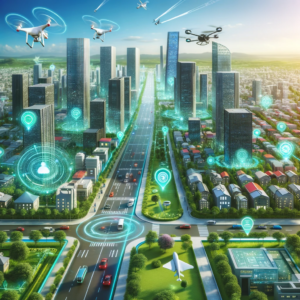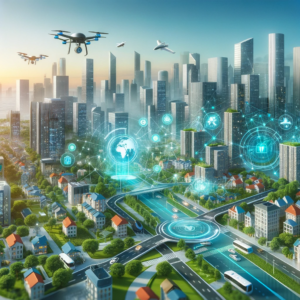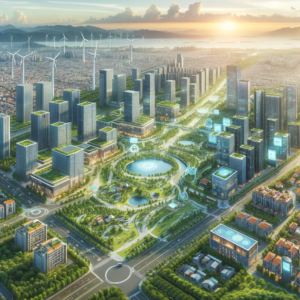In this article, we will explore the concept of smart cities and how the integration of technology is paving the way for sustainable urban development. The emergence of smart cities marks a significant shift in how urban areas are designed, managed, and experienced, offering a blueprint for a more efficient, sustainable, and livable future.
Introduction to Smart Cities
Smart cities represent the intersection of urban planning, sustainability, and digital technology. They leverage data and technology to improve the efficiency of city services, reduce environmental impact, and enhance the quality of life for residents. The core idea is to create cities that are not only habitable but also resilient and adaptable to changing needs and challenges.
Key Components of Smart Cities
The foundation of a smart city lies in its infrastructure. This includes advanced communication networks, intelligent transportation systems, energy-efficient buildings, and sustainable resource management. IoT (Internet of Things) sensors play a crucial role, collecting real-time data on everything from traffic patterns to energy usage, which can be used to optimize city functions and services.
Improving Urban Living
Smart cities aim to enhance the urban living experience. This encompasses reducing traffic congestion through smart traffic management systems, improving air quality with environmental monitoring, and ensuring public safety with intelligent surveillance systems. Additionally, smart cities focus on providing accessible and efficient public services, from healthcare to education.

Sustainability and Environmental Impact
One of the most significant benefits of smart cities is their potential for environmental sustainability. By optimizing energy use, managing waste efficiently, and implementing green initiatives, smart cities can significantly reduce their carbon footprint. This is crucial in the fight against climate change and for the creation of a sustainable future.
Economic Development and Opportunities
Smart cities also spur economic development. They attract businesses and investments, particularly in the technology sector, and create new employment opportunities. The efficient use of resources and improved infrastructure can lead to cost savings for both the government and the residents.
Challenges and Privacy Concerns
However, the development of smart cities is not without challenges. One of the biggest concerns is privacy and data security. The extensive collection and analysis of data raise questions about how this information is used and protected. Additionally, there is a risk of creating digital divides, where access to technology determines the quality of urban life.

Case Studies of Successful Smart Cities
Around the world, cities like Singapore, Barcelona, and Amsterdam have emerged as leaders in the smart city movement. These cities have implemented innovative technologies to improve mobility, sustainability, and livability, serving as models for others to follow.
The Role of Citizens and Community Engagement
The success of a smart city depends on the active participation of its residents. Citizen engagement is crucial in the planning and implementation stages to ensure that the development meets the actual needs of the community. Furthermore, educating citizens about the benefits and use of smart technologies is essential for their adoption and effectiveness.
The Future of Smart Cities
Looking to the future, the potential of smart cities is boundless. With advancements in AI, 5G, and IoT, the integration of technology in urban environments will only deepen. This will lead to even more innovative solutions to urban challenges, from autonomous vehicles to AI-driven public services.
Conclusion: A Blueprint for Urban Innovation
Smart cities represent a new paradigm in urban development. By harnessing technology, they offer a vision of a more efficient, sustainable, and enjoyable urban future. While challenges remain, the potential benefits make the pursuit of smart city initiatives an exciting and necessary endeavor for a rapidly urbanizing world.
